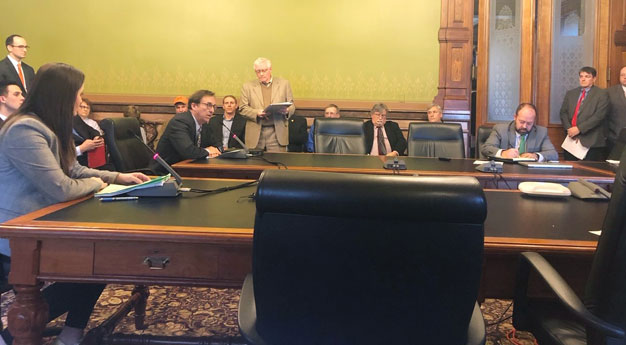
Tom Chapman, executive director of the Iowa Catholic Conference, talks with legistators in this 2020 photo.
By Tom Chapman
For The Catholic Messenger
Several bills have been introduced at the Iowa Legislature to provide some parents with Education Savings Accounts (Students First scholarships) to help them afford tuition to a Catholic school. The bills typically would provide about $5,400 per child. House File 2223 would provide “Hope Scholarship” Education Savings Accounts in 2023 to current freshmen and sophomores in Catholic and other nonpublic schools as well as all public school students who wish to move to a nonpublic school. The program would expand in future years to help all students. Go to http://www.votervoice.net/icc/ home to share your comments.
Asset test for food stamps
We may be making some progress in our efforts to stop the proposed “asset test” that would push many people off food stamps/SNAP. We are also monitoring legislation to increase the verification of income that recipients will need to provide. If the verification system is too onerous, people who qualify for benefits will drop off anyway. For more information go to www.iowahungercoalition.org.
E-verify system
Senate File 339, which passed the Senate Judiciary Committee, would require businesses to use the voluntary federal e-verify system to confirm the eligibility of their employees to work in the United States. The Iowa Catholic Conference (ICC) has opposed the bill because, if enforced, it would likely cause people to lose their jobs unjustly or to not be hired because of system errors. It would also create opportunities for racial discrimination as individuals allege violations of the law. A companion bill, House Study Bill 635, has been introduced in the House.
Pregnant women
House File 2257, which has ICC support, would require employers to provide reasonable accommodations to employees based on pregnancy or childbirth. We believe pregnant women should receive special consideration to meet their needs.
Tax cut bills advance
Gov. Kim Reynolds’ and Republican tax cut bills, which would create a “flat” income tax, among other changes, are moving through the legislative process. By coincidence, Pope Francis met last week with the Revenue Department of Italy. The pope said taxation should safeguard “the dignity of the poor and the least, who always risk being trodden underfoot by the powerful. The tax man, when he or she is just, promotes the common good.”
In terms of dollar amounts, wealthier people will receive more benefit from the proposals than will people with low incomes. The pope referenced the social doctrine of the Church and Scripture in his meeting in Italy to urge everyone to understand that the goods of creation are intended for humankind as a whole, while also recognizing the individual right to property.
Meanwhile, Iowa Democrats have proposed an increase in the Earned Income Tax Credit for low-income workers, which the ICC has supported before, and an expansion of the child and dependent care tax credit.
COVID-19
Gov. Reynolds has extended her emergency COVID proclamation until Feb. 15 and then will let it expire. View a new video in ICC’s vaccination campaign at https://youtu.be/QwpS4NNGvGg.
Unemployment insurance
The Legislature is considering several bills to cut back on unemployment insurance benefits, including House File 2279 and Senate Study Bills 3093 and 3096. Under the proposals, the state would reduce benefits to a total of four months and require recipients to take lower-paying jobs sooner. The bill would also add a one-week waiting period for benefits.
Iowa’s unemployment rate is already dropping and the number of working Iowans is increasing. The purpose of the unemployment system is to help people who have been laid off through no fault of their own. We should be very cautious about changing the unemployment insurance system in ways that could harm vulnerable families.
Justice issues
House Study Bill 607, supported by the ICC, would reduce punishments and collateral consequences that come from noncriminal “technical” probation violations. The plan is not to send people back to prison unless it’s necessary. The bill would also create incentives for offenders to seek education. House File 2131 would create a stronger process for the possibility of commutations. The ICC has been working in support of similar legislation for a few years. A person who has been sentenced to life imprisonment and has served 35 years of their sentence would be allowed to make an application for commutation to the governor and parole board every five years. The parole board could make a recommendation to the governor by majority vote.
Gambling bill considered
The ICC opposes a bill to allow online casinos (House Study Bill 604) and another bill that permits “cashless wagering” (House Study Bill 578). Cashless wagering allows the transfer of money directly from phone to slot machine. Nothing in the bill would stop people from emptying their bank account without getting up from the machine. A recent report on problem gambling services in Iowa already suggests a “large gap between the number of Iowans who would benefit from problem gambling treatment services and the number who receive those services.”
English bill
Bills introduced at the Legislature would change the law that establishes English as Iowa’s official language. Senate File 2068 and House File 2192 would add the phrase “and any other language deemed necessary to achieve the purposes of the state of Iowa and the political subdivisions of the state.” We have heard from some immigrant and refugee communities who say the current law has affected them negatively due to language barriers.
Energy efficiency
The ICC also supports House File 2193, which would create a grant program for energy efficiency and renewable energy projects for nonprofit organizations, including churches.
Contact legislators
To contact your legislators on these issues, go to our website at www.iowacatholicconference.org/voter-voice.
(Tom Chapman is executive director of the Iowa Catholic Conference.)








